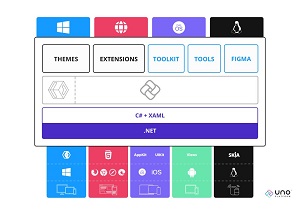News
Uno Platform 4.0 Adds Visual Studio Code Plugin
Uno Platform 4.0 is out, highlighted by a new extension for working in Microsoft's Visual Studio Code editor.
The open source Uno Platform is a major player in the Microsoft-centric dev space, claiming the only offering that enables development of single-codebase applications for Windows, WebAssembly, iOS, macOS, Android and Linux, targeting all OSes and browsers. It has also teamed up with Microsoft on project such as WinUI 3 and has even beaten Microsoft at its own game in some respects, for example being the first to provide Ahead of Time (AOT) compilation for WebAssembly, the tech behind client-side Blazor.
 [Click on image for larger view.] Uno Platform 4.0 (source: Uno Platform).
[Click on image for larger view.] Uno Platform 4.0 (source: Uno Platform).
The new v4.0 offering adds four major components, one of which is the VS Code integration coming via an extension in the Visual Studio Code Marketplace, now in the preview stage.
The extension is used with Uno Platform C#/XAML projects for WebAssembly and Skia-based targets, providing features traditionally seen only in the Visual Studio IDE such as:
- Developing on Codespaces and GitPod
- Developing on Windows, Linux and macOS
- XAML Code Completion, providing an authoring experience when adding element names and properties, properties values, namespace values, x:Bind completion, among others, powered by a XAML Language Server developed for this purpose
- XAML Hot Reload, allowing a running application’s XAML files to be edited and changes applied while the application is running
- C# Hot Reload for Skia and WebAssembly targets, relying on .NET’s own Hot Reload feature integrated into the runtime
- WebAssembly C# debugging when running on local environments
The preview is free to use now and the final version will be free for all independent developers and those in organizations with less than $1 million in revenue.
In addition to Visual Studio Code integration, developers will also be able to integrate with GitHub Codespaces and GitPod, providing the ability to create single-codebase, multi-platform applications from whatever OS they want to use.
The other three major components added in the new version include:
- Integration with Figma, a collaborative interface design tool, enabling developers to design an application for Material Design and quickly generate XAML from Figma
- Uno Platform Extensions to provide commonly used functions to help with new application bootstraps following proper architecture, including configuration, logging, serialization, HTTP, localization, navigation and more
- Uno Toolkit, a set of higher-level multiplatform components not available in out-of-the-box WinUI
"Following today’s announcements, with Uno Platform you will be able to develop C# and XAML applications from any operating system or browser, and deploy them to Web, Android, iOS, macOS, Linux and Windows," Uno Platform said in announcing the new version.
About the Author
David Ramel is an editor and writer at Converge 360.